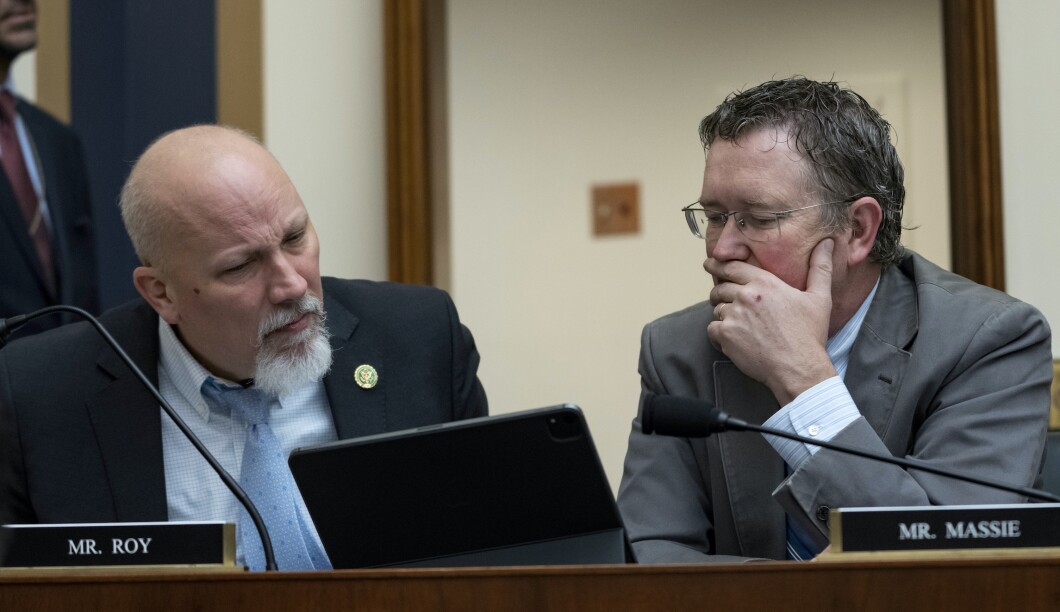
The vote of an eclectic, anti-establishment Republican could prove pivotal to the fate of Speaker Kevin McCarthy’s (R-CA) debt ceiling deal as the powerful Rules Committee considers on Tuesday whether to bring the 99-page bill to the floor.
McCarthy and President Joe Biden reached an “agreement in principle” on Saturday to raise the debt ceiling in exchange for modest spending cuts. GOP leadership released the bill’s text less than a day later, setting off a mad scramble by lawmakers to review and pass the bill before a June 5 deadline to avoid default.

DEBT CEILING DEAL: READ THE FULL LEGISLATIVE TEXT AIMED AT AVERTING A DEFAULT
The two leaders voiced confidence the legislation will pass both chambers of Congress in time, a prospect that was buoyed when the chairwoman of the New Democrat Coalition, a group of nearly 100 centrist Democrats, announced she would support the deal on Monday.
But first, the bill must clear the Rules Committee, where Rep. Thomas Massie (R-KY) will seemingly decide its fate in a meeting scheduled for 3 p.m.
Democrats on the panel typically don’t vote for legislation drafted by the majority and have signaled they won’t help out Republicans on this one, either. This ordinarily wouldn’t be a problem since the GOP controls the panel 9-4.
But two hard-liners who were elevated to the committee in January as part of a GOP deal to elect McCarthy speaker, Reps. Chip Roy (R-TX) and Ralph Norman (R-SC), appear ready to vote against the legislation on Tuesday, disappointed that it didn’t go further in its spending cuts.
That leaves Massie, a libertarian dubbed “Mr. No” for how often he votes against legislation, to cast the deciding vote. Massie himself was added to the Rules Committee as a conservative check on McCarthy’s power but has not given the speaker the same headaches as members of the House Freedom Caucus.
He voted for McCarthy on all 15 rounds in the speakership election in January and helped serve as a bridge between GOP leadership and the 20 Republican holdouts who opposed his bid.
But Massie, who aligns with the caucus on fiscal austerity — he regularly sports a national debt clock on his jacket lapel — has yet to say how he will vote on Tuesday. His office declined to disclose where he stands.
Working in McCarthy’s favor is the fact that negotiators included in the debt limit legislation Massie’s “penny plan,” which would put in place a 1%, across-the-board spending cut if Congress cannot pass all 12 of its annual spending bills.
Massie touted the plan’s inclusion in a Sunday tweet.
He’s also hesitant to influence the outcome of legislation using his new perch on the Rules Committee.
“I’m ready and fully prepared to vote for rules on bills that I’ll be a ‘hell no’ on the bill when it gets to the floor,” Massie told the Hill in January, shortly after joining the committee.
The congressman’s silence has injected yet another day of suspense into the drama that has been the debt ceiling standoff.
The two sides inched closer to a deal across more than two weeks of talks, with a series of hangups on everything from spending caps to work requirements threatening to derail an agreement.
The bill that emerged is a delicate compromise that moved Democrats off their initial refusal to negotiate over the debt ceiling but avoids the sort of steep spending cuts House Republicans passed in their April debt limit bill.
In exchange for a two-year hike in the federal borrowing limit, the legislation roughly freezes next year’s spending at fiscal 2023 levels, followed by a 1% increase in 2025. The legislation also imposes some changes to work requirements for food stamps and will speed the development of energy projects with permitting reform.
Conservative hard-liners, including Roy, have threatened to go to “war” over the compromise, yet McCarthy appeared unconcerned on Monday.
Asked if he was worried the bill could get derailed in the Rules Committee, he simply told reporters, “Nope.”
CLICK HERE TO READ MORE FROM THE WASHINGTON EXAMINER
Massie, for his part, has declined to disparage the bill since it was released on Sunday. Roy defended his colleague as “principled” in the face of criticism from grassroots conservatives.
“Thomas is one of the best members of Congress and my very good friend,” he tweeted on Monday. “He approaches everything with principle. Wherever he lands on this, it will be principled.”





